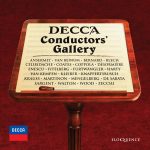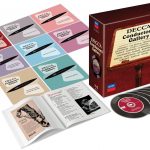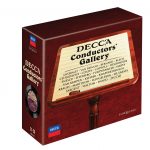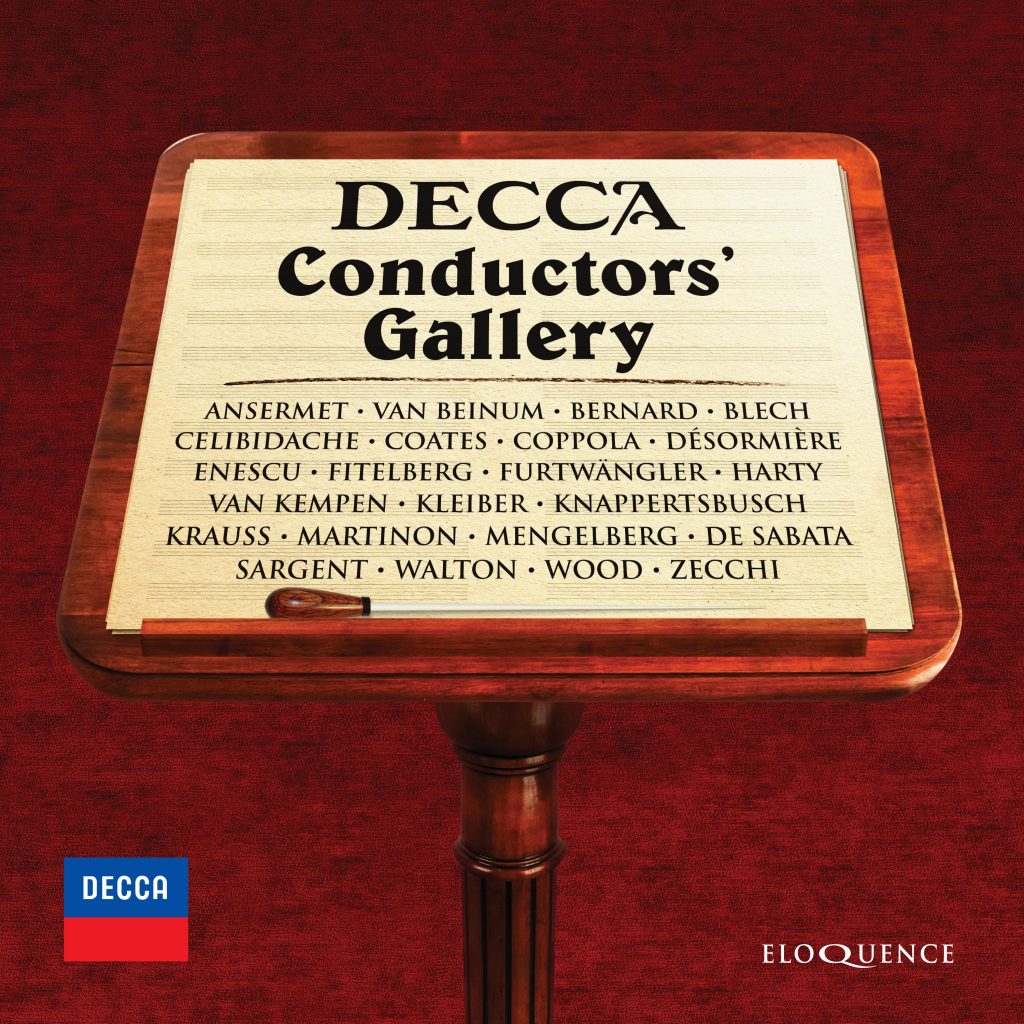
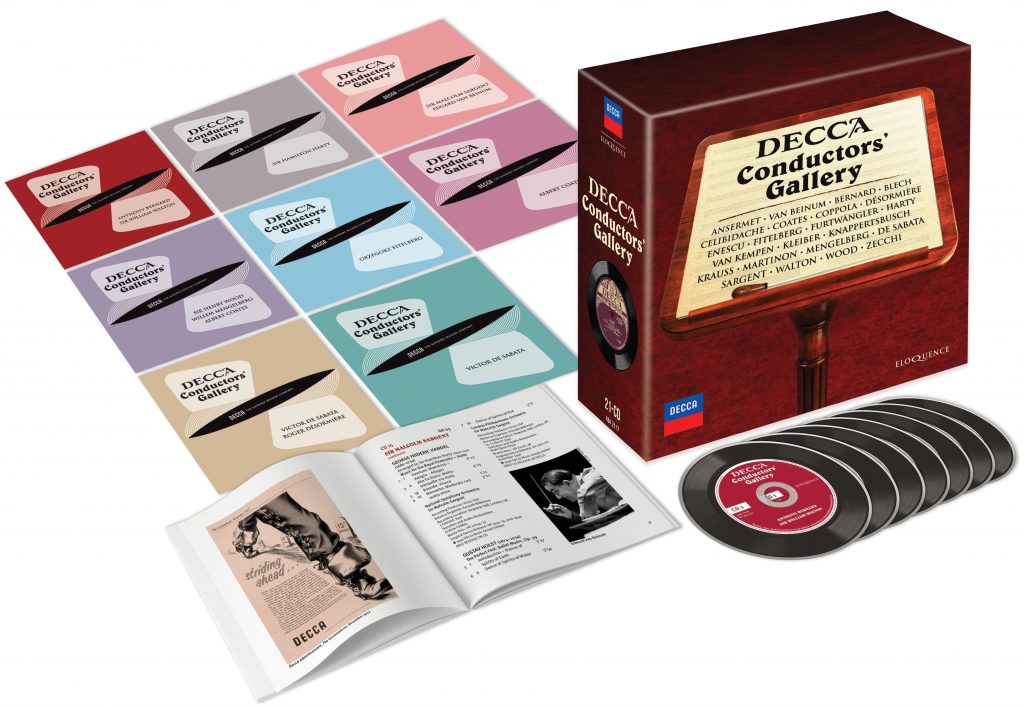
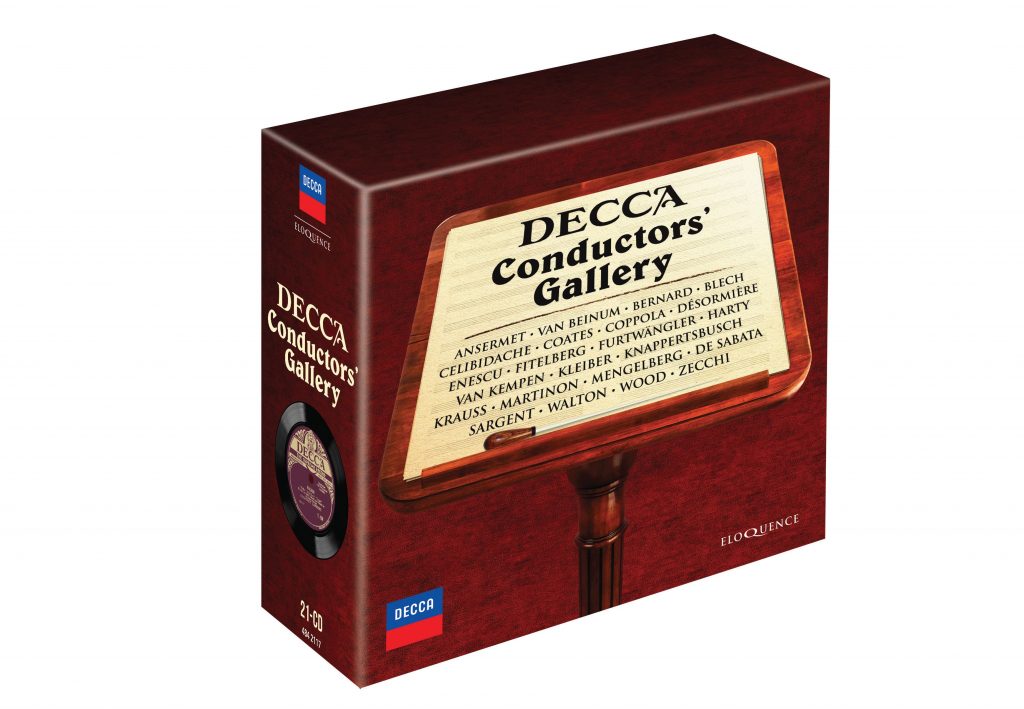
ANSERMET · VAN BEINUM · BERNARD · BLECH · CELIBIDACHE · COATES · COPPOLA · DÉSORMIÈRE · ENESCU · FITELBERG · FURTWÄNGLER · HARTY · VAN KEMPEN · KLEIBER · KNAPPERTSBUSCH · KRAUSS · MARTINON · MENGELBERG · DE SABATA · SARGENT · WALTON · WOOD · ZECCHI
Spanning almost twenty years, the unique story of this set begins in May 1929 with Decca’s first major recording, Delius’s Sea Drift – a performance whose merits were obscured at the time by surface noise, but which the latest technology reveals to be a gloriously sympathetic reading of Delius’s poignant elegy. Back then, the conductor (Anthony Bernard) was not even printed on the 78 labels; yet, for a later recording in the set, a suite of Handel, the name of Erich Kleiber stands out: a sign of how far the label travelled in its first twenty years, through some choppy commercial waters, to become a byword for technological excellence and world-class musical artistry drawn from around the globe.
The pre-war recordings inevitably centre on British/Irish conducting talent, old and new: Hamilton Harty, dynamic in Haydn and Walton; Walton himself, in a definitive first recording of Façade; atmospheric Vaughan Williams, Elgar and Coates from Henry Wood. One of the rarest items in the set is Bach’s Concerto for Two Violins as led by Mengelberg in 1936.
The post-war material includes several great names of the podium from those pre-war days, judiciously picked up by Decca when they might otherwise have been forgotten: Albert Coates whipping up a frenzy in the Russian repertoire he made his own; Clemens Krauss, incandescent in Strauss from Milan and London; Leo Blech’s genial ‘Surprise’ Symphony of Haydn.
Senior composer-conductors include Fitelberg in Tchaikovsky’s Symphony No. 3 and Enescu in Schumann’s Second. Then there are thrilling young podium tyros who were setting London musical life alight in the postwar years: Celibidache’s electrifying and wayward Tchaikovsky, Martinon’s exquisite Ravel, Coppola’s majestic Schumann.
A note from the remastering engineer Andrew Hallifax explains the history behind this first-ever release of Handel choruses conducted by Sir Malcolm Sargent. Mark Obert-Thorn explains his choice of treasures for this box and introduces the history of Decca and its revolutionary development of ‘full frequency range recording’ in the late 1940s. Peter Quantrill expands the historical perspective with notes on both Decca and each of the individual conductors in the box.
CD 1
ANTHONY BERNARD
Delius: Sea Drift (with Roy Henderson)
Walton: Overture ‘Portsmouth Point’
New English Symphony Orchestra & Chorus
SIR WILLIAM WALTON
Walton: Façade (with Edith Sitwell, Constant Lambert); Viola Concerto (with Frederick Riddle)
London Symphony Orchestra
CD 2
SIR HAMILTON HARTY
Walton: Symphony No. 1
Haydn: Symphony No. 95
Berlioz: Overture ‘Le Roi Lear’; Marche troyenne (Les Troyens)
London Symphony Orchestra
CD 3
SIR HAMILTON HARTY
Handel–Harty: Suite in Five Movements
London Symphony Orchestra
SIR HENRY WOOD
Purcell–Wood: Suite in Five Movements
Vaughan Williams: Fantasia on Greensleeves; Overture ‘The Wasps’; Symphony No. 2 ‘A London Symphony’
Queen’s Hall Orchestra
CD 4
SIR HENRY WOOD
Coates: London Suite; London Bridge – March
Elgar: Enigma Variations
Queen’s Hall Orchestra
WILLEM MENGELBERG
J.S. Bach: Concerto for Two Violins (with Louis Zimmermann, Ferdinand Helman)
Gluck: Overture ‘Alceste’
Concertgebouworkest
ALBERT COATES
Mussorgsky: A Night on the Bare Mountain; Gopak (Sorochintsy Fair)
London Symphony Orchestra
CD 5
ALBERT COATES
Rimsky-Korsakov: Snegurochka – Suite
National Symphony Orchestra
Rimsky-Korsakov: Le Coq d’or – Suite
London Symphony Orchestra
Tchaikovsky: Symphony No. 6 ‘Pathétique’; Romeo and Juliet – Fantasy Overture
National Symphony Orchestra
CD 6
VICTOR DE SABATA
Beethoven: Symphony No. 3 ‘Eroica’
Berlioz: Overture ‘Le Carnaval romain’
Sibelius: Valse triste
Wagner: Ride of the Valkyries (Die Walküre)
London Philharmonic Orchestra
CD 7
VICTOR DE SABATA
Sibelius: En saga
London Philharmonic Orchestra
ROGER DÉSORMIÈRE
Bizet: Ouverture ‘Patrie’; Jeux d’enfants – Petite Suite
Chabrier: Habanera
Debussy: Marche ecossaise
National Symphony Orchestra
Opera Arias – Gounod, Offenbach, Thomas, Proch, Charpentier (with Janine Micheau)
Orchestre de la Société des Concerts du Conservatoire
CD 8
GRZEGORZ FITELBERG
Wagner: Overture ‘Die Meistersinger von Nürnberg’
London Philharmonic Orchestra
Tchaikovsky: Piano Concerto No. 2 (with Eileen Joyce)
London Philharmonic Orchestra
Tchaikovsky: Symphony No. 3
London Philharmonic Orchestra
CD 9
GRZEGORZ FITELBERG
Borodin: Polovtsian Dances (Prince Igor)
Rimsky-Korsakov: The Tale of Tsar Saltan – Suite
London Philharmonic Orchestra
WILHELM FURTWÄNGLER
Brahms: Symphony No. 2
London Philharmonic Orchestra
CD 10
CARLO ZECCHI
Rossini: Overture ‘La Scala di Seta’
Pizzetti: La Pisanelle – Suite
Beethoven: Piano Concerto No. 4 (with Clara Haskil)
London Philharmonic Orchestra
PIERO COPPOLA
Grieg: Symphonic Dances Nos. 1, 2 & 4
London Symphony Orchestra
CD 11
PIERO COPPOLA
Schumann: Symphony No. 1
National Symphony Orchestra
GEORGE ENESCU
Schumann: Symphony No. 2
London Philharmonic Orchestra
CD 12
ERNEST ANSERMET
Debussy: Petite Suite
Orchestre de la Société des Concerts du Conservatoire
Debussy: La Mer
Ravel: Alborada del gracioso (Miroirs)
Orchestre de la Suisse Romande
Ravel: Shéhérazade (with Suzanne Danco); La Valse
Orchestre de la Société des Concerts du Conservatoire
CD 13
CLEMENS KRAUSS
Beethoven: Overture ‘Fidelio’
London Philharmonic Orchestra
Brahms: Academic Festival Overture
London Symphony Orchestra
Strauss: Tod und Verklärung
London Philharmonic Orchestra
Strauss: Till Eulenspiegels lustige Streiche
Orchestra del Teatro alla Scala
PAUL VAN KEMPEN
Wagner: Overtures, ‘Tannhäuser’ & ‘Der fliegende Holländer’
CD 14
SIR MALCOLM SARGENT
Handel: Messiah, Israel in Egypt, Semele, Alexander’s Feast, Solomon, Serse – excerpts; Zadok the Priest
(with Kathleen Ferrier, Richard Lewis, Trevor Anthony)
Royal Choral Society
London Symphony Orchestra
CD 15
SIR MALCOLM SARGENT
Handel–Harty: Music for the Royal Fireworks – Suite
National Symphony Orchestra
Holst: The Perfect Fool – ballet music
London Philharmonic Orchestra
EDUARD VAN BEINUM
Elgar: Overture ‘Cockaigne’
London Philharmonic Orchestra
Britten: Four Sea Interludes & Passacaglia from Peter Grimes
Concertgebouworkest
Arnold: Overture ‘Beckus the Dandipratt’
London Philharmonic Orchestra
CD 16
EDUARD VAN BEINUM
Mahler: Lieder eines fahrenden Gesellen (with Eugenia Zareska)
London Philharmonic Orchestra
Bruckner: Symphony No. 7
Concertgebouworkest
CD 17
HANS KNAPPERTSBUSCH
Wagner: Overture ‘Rienzi’; Tannhäuser – Overture & Venusberg Music; Lohengrin – Prelude to Act III; Die Meistersinger von Nürnberg – Prelude to Act III, Dance of the Apprentices, March of the Guild
London Philharmonic Orchestra
Wagner: Lohengrin – Prelude to Act I
Tonhalle-Orchester Zürich
Wagner: Die Meistersinger von Nürnberg – Prelude to Act I
Orchestre de la Suisse Romande
CD 18
ERICH KLEIBER
Handel: Andante larghetto (Berenice)
Mozart: Symphony No. 40
Beethoven: Symphony No. 6 ‘Pastoral’
London Philharmonic Orchestra
CD 19
ERICH KLEIBER
Josef Strauss: Sphärenklänge
Johann Strauss II: Overture ‘Der Zigeunerbaron’
Dvořák: Overture ‘Carnaval’
London Philharmonic Orchestra
JEAN MARTINON
Tchaikovsky: Da, čas nastal! … Prostite vï, kholmï, polya rodnïye (The Maid of Orléans) (with Eugenia Zareska)
Chabrier: Suite Pastorale
Ravel: Le Tombeau de Couperin
London Philharmonic Orchestra
CD 20
LEO BLECH
Humperdinck: Prelude ‘Hänsel und Gretel’
Haydn: Symphony No. 94 ‘Surprise’
Orchestre de la Suisse Romande
SERGIU CELIBIDACHE
Mozart: Symphony No. 25
London Philharmonic Orchestra
CD 21
SERGIU CELIBIDACHE
Tchaikovsky: Symphony No. 5; The Nutcracker – Suite
London Philharmonic Orchestra
“There is much that reflects Furtwängler’s great attention to dynamic relationships, his sense of architecture, and his ear for balance and color. He whips up quite a phenomenal bit of energy for the final coda.” Fanfare, July 2020 (Furtwängler – Brahms: Symphony No. 2)
“Mr. Riddle seems to get ample sonority and a good deal of variety out of the solo part, and the recording is clear and free from harshness.” Gramophone, February 1938 (Walton: Viola Concerto)
“[Harty] shows clearly how much of the work’s success was due to his inspired advocacy. He brings out the vehemence and passion very starkly, but also finds an underlying rock-like strength.” Gramophone, December 1993 (Harty – Walton: Symphony No. 1)
“It would be difficult to exaggerate the concentrated power of this music, which is superbly performed and recorded.” The Record Guide, 1955 (Van Beinum – Britten: Four Sea Interludes)
“The performance is not less than magnificent, and the brass in the Adagio give a splendid display of legato phrasing and rich, solemn tone.” The Record Guide, 1955 (Van Beinum – Bruckner: Symphony No. 7)
“The unfolding of the musical action is presented with a wonderful sense of drama; and Knappertsbusch draws playing of great sonority, tonal beauty and meaning from his orchestra.” The Record Guide, 1955 (Knappertsbusch – Wagner, Rienzi Overture)
“A good time is had by all, in a brightly coloured, forward recording.” Gramophone, December 1935 (Wood – Coates: London Suite)
“Here is an excellent example of Berlioz in his stirring celebratory mood.” Gramophone, December 1935 (Harty – Berlioz: Marche troyenne)
“The luminosities of Handel’s writing are made still more enlightening.” Gramophone, December 1935 (Harty – Handel: Suite)
“The finest technical achievement of the Decca Company up to date. There is nothing to criticise in it and everything to praise.” Gramophone, July 1936 (Wood – Vaughan Williams: A London Symphony)
“Very impressive, and the [Eroica] as a whole is vividly played … The outstanding item is a breathtaking account of Berlioz’s Carnaval romain Overture, which I have never heard surpassed.” Gramophone, July 1991 (De Sabata – Beethoven, Berlioz)
“What a performance! If anyone says it is too Italian for his ears, I will pay for his ears to be amputated forthwith. En Saga, too, is a revelation.” High Fidelity, July 1976 (De Sabata – Beethoven, Sibelius)
“En Saga unleashes an almost orgiastic outburst. By any reckoning, these performances are masterfully led and, for their time, remarkably realistic sounding.” High Fidelity, September 1977 (De Sabata – Sibelius, Berlioz, Wagner)
“One of Handel’s most glorious melodies sustained under Kleiber’s baton with hypnotic control… Beethoven’s Pastoral is another winner … Kleiber’s way with Sphärenklange and Der Zigeunerbaron is sheer perfection.” Gramophone, January 2020 (Kleiber – Handel, Beethoven, Strauss)
“An intelligent but not cramping respect for the composer’s instructions, an appreciation of what can be done with tiny variations of rhythm … and a mastery of diction that has become increasingly rare.” Gramophone, April 2004 (Ansermet/Danco – Ravel: Shéhérezade)
“Eduard Van Beinum coaxes his players to a performance that dazzles the listener by its sheer virtuosity. This, topped by a brilliant recording, is a breath-taking experience.” Tempo, Spring 1954 (Van Beinum – Britten)
“Unerringly paced and played with restrained beauty and great concentration.” Gramophone, July 2000 (Enescu – Schumann: Symphony No. 2)
“[Coppola] brings to this performance an altogether outstanding sympathy and a close understanding of Schumann’s essential warm-heartedness, while securing a cleanness of texture which is by no means common.” Gramophone, July 1949 (Coppola)
“Reminds us of a fine artist and times that were in some ways more musically propitious than our own.” Gramophone, July 1988 (Zecchi/Haskil – Beethoven, Piano Concerto No. 4)
“A most sensitive and artistic performance, and the sheer beauty of the orchestral playing is a delight.” Gramophone, July 1949 (Krauss – Strauss: Tod und Verklärung)
“An excellent demonstration of the orchestra’s colour and flexibility … Zecchi has the right touch, we can hear.” Gramophone, April 1949 (Zecchi – Rossini: La scala di seta)
“Joyce seizes the heady bravura of her role with thrilling vitality and precision. This, you feel, is going to be an extraordinary reading.” Gramophone, February 2018 (Fitelberg/Joyce – Tchaikovsky: Piano Concerto No. 2)
“A lively, straightforward reading that allows the music to speak for itself.” Gramophone, November 1950 (Kleiber – Mozart: Symphony No. 40)
“A fine achievement … The atmosphere is simple and kindly, but has too a touch of triumph and success about it.” Gramophone, December 1951 (Kleiber – Beethoven: Symphony No. 6)
“Jean Martinon seems to be a conductor of rare sensibility judging by his reading of this subtle score. The playing of the LPO is absolutely first-rate.” Gramophone, April 1950 (Martinon – Ravel: Le tombeau de Couperin)
“The performance is excellent; the finale in particular is deliciously poised, and played with a neatness and lack of fuss which is sheer joy. The recording is first-class.” Gramophone, October 1949 (Blech – Haydn, Symphony No.94)
“I like it at this sober pace, when you can hear all the accompaniments, and relish the point-to-point story-telling spirit.” Gramophone, July 1948 (Blech – Humperdinck: Hänsel und Gretel Overture)
“Strong body and piquancy in the recording … In grace, lightness and an angelic smile for childhood, the French are incontestable.” Gramophone, July 1948 (Désormière – Bizet: Jeux d’enfants)
“The Tchaikovsky suite brings the magic … The music enters with a brilliance and sparkle that had me remembering our first wonderment in the dying days of 78 at the extended range of Decca ffrr.” Gramophone, July 1979 (Celibidache – Tchaikovsky: Nutcracker Suite)

